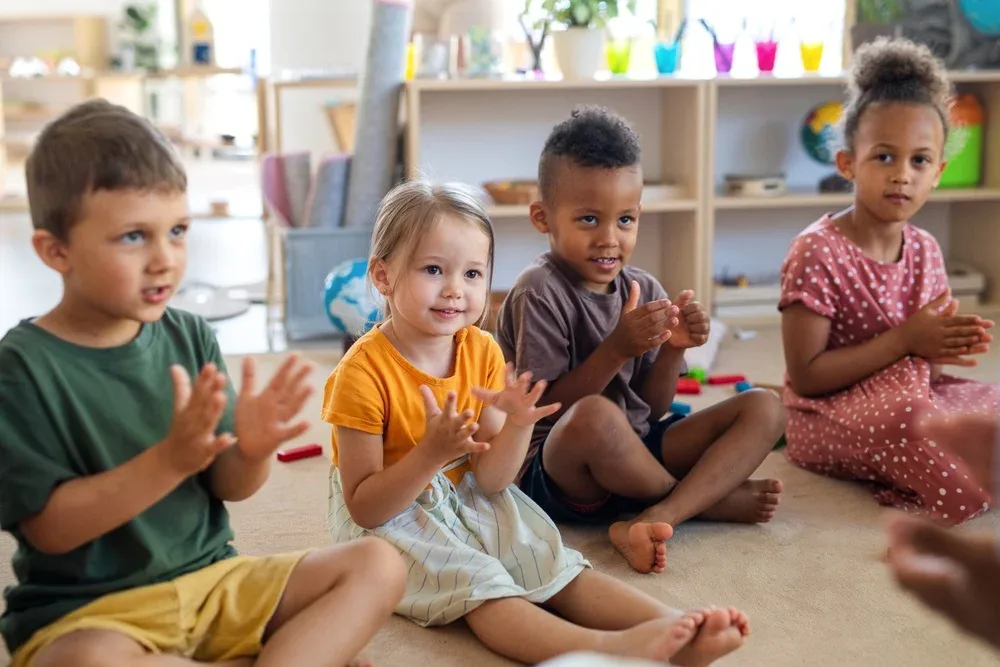
In today’s fast-paced world, many parents entrust daycare facilities with their children’s care and early education. One common concern among parents is whether daycare positively influences their child’s speech development. Let’s answer the question “Is Daycare Good for Speech?” to understand the impact of daycare on speech skills.
Contents
- 1 Importance of Early Language Development
- 2 Social Interaction in Daycare Settings
- 3 Exposure to Language-Rich Environments
- 4 Diversity of Language Models
- 5 Structure and Routine in Daycare Aiding Speech Development
- 6 Activities Promoting Language Skills in Daycare
- 7 Role of Caregivers and Educators in Speech Development
- 8 Peer Interaction and Language Acquisition
- 9 Challenges in Daycare Environments for Speech Development
- 10 Strategies for Parents to Support Speech Development in Daycare
- 11 Professional Guidance and Intervention
- 12 Case Studies Highlighting Positive Outcomes
- 13 Myths Surrounding Daycare and Speech Development
- 14 FAQs
- 15 Conclusion
Importance of Early Language Development
Early language development lays the foundation for a child’s communication skills. Research suggests that the first few years of life are crucial for language acquisition and proficiency. Children exposed to rich language environments tend to develop stronger communication abilities during this period. Language is a means of communication and a tool for cognitive development and social interaction. It helps children express their thoughts, needs, and emotions, forming the basis for future academic and social success.
Social Interaction in Daycare Settings
Daycare environments offer ample opportunities for social interaction, essential for speech development. Interacting with peers and caregivers encourages children to communicate, express themselves, and learn from others. Children learn new words, phrases, and conversational patterns through daily interactions, enhancing their language skills. Moreover, social interaction fosters empathy, cooperation, and conflict resolution, essential skills for navigating interpersonal relationships in later life.
Exposure to Language-Rich Environments
Daycare centers often provide language-rich environments where books, educational toys, and engaging activities surround children. These settings stimulate language development by exposing children to various words, sounds, and language structures. Regular exposure to language helps children expand their vocabulary and grasp grammar rules intuitively. Furthermore, exposure to diverse literary genres, storytelling techniques, and cultural narratives enriches children’s linguistic and cultural awareness, fostering a love for reading and lifelong learning.
Diversity of Language Models
In daycare, children encounter diverse language models, including caregivers, peers, and other adults. Exposure to different accents, dialects, and communication styles enriches their linguistic repertoire. Interacting with individuals from various backgrounds broadens children’s understanding of language diversity and fosters cultural appreciation. Moreover, exposure to multilingual environments enhances children’s cognitive flexibility and problem-solving abilities, preparing them for success in an increasingly globalized world.
Structure and Routine in Daycare Aiding Speech Development
Daycare routines provide structure and consistency, which are beneficial for speech development. Regular schedules ensure that children engage in language activities such as storytelling, singing, and group discussions daily. Consistent exposure to language-learning opportunities supports the gradual progression of speech skills. Moreover, routines help children develop self-regulation skills, such as attention, concentration, and impulse control, essential for effective communication and academic achievement.
Activities Promoting Language Skills in Daycare
Daycare centers incorporate various activities designed to promote language skills. These may include storytelling sessions, role-playing exercises, and language-based games. Such activities encourage children to communicate, listen actively, and use language creatively, enhancing their linguistic competence. Moreover, hands-on experiences like cooking, gardening, and crafts allow children to use language in meaningful contexts, reinforcing vocabulary acquisition and concept development.
Role of Caregivers and Educators in Speech Development
Caregivers and educators are vital in facilitating speech development in daycare settings. They create a nurturing environment where children feel encouraged to communicate and express themselves freely. Caregivers support each child’s unique linguistic journey through positive reinforcement and effective communication strategies. Moreover, trained educators implement evidence-based practices, such as dialogic reading, language modeling, and scaffolded instruction, to enhance children’s language skills systematically.
Peer Interaction and Language Acquisition
Interacting with peers is a key aspect of language acquisition in daycare. Children learn from each other through play, collaboration, and imitation. Peer interactions promote language development by providing conversation, negotiation, and problem-solving opportunities, fostering linguistic growth in a social context. Moreover, peer feedback and peer tutoring enhance children’s metacognitive awareness and communication strategies, empowering them as active participants in their learning process.
Challenges in Daycare Environments for Speech Development
While daycare offers numerous benefits for speech development, some challenges may arise. Large group sizes, noise levels, and distractions can sometimes hinder effective communication. Children with speech delays or language disorders may also require individualized support to thrive in daycare settings. However, with appropriate accommodations, such as small group activities, quiet spaces, and assistive technology, children with diverse needs can participate fully in daycare programs and make meaningful progress in their speech development.
Strategies for Parents to Support Speech Development in Daycare
Parents can actively support their child’s speech development in daycare by maintaining open communication with caregivers and participating in language-focused activities at home. Reading to children, engaging in conversations, and exposing them to diverse language experiences outside of daycare can complement their learning journey. Moreover, parents can collaborate with daycare staff and specialists to implement consistent strategies and monitor their child’s progress.
Professional Guidance and Intervention
In cases where children experience speech delays or difficulties, seeking professional guidance is crucial. Speech-language pathologists can assess individual needs and provide targeted interventions for language development. Collaborating with daycare professionals and specialists ensures holistic support for children facing speech-related challenges. Moreover, ongoing professional development for daycare staff and partnerships with community resources enhance the quality and effectiveness of speech services in daycare settings.
Case Studies Highlighting Positive Outcomes
Numerous case studies illustrate the positive impact of daycare on speech development. Children who attend high-quality daycare programs often demonstrate advanced language skills, improved social communication, and enhanced confidence in verbal expression. These success stories underscore the valuable role of daycare in nurturing speech development. Moreover, longitudinal studies tracking children’s language development over time provide valuable insights into the long-term benefits of early intervention and inclusive practices in daycare settings.
Myths Surrounding Daycare and Speech Development
Despite its benefits, daycare is sometimes subject to misconceptions regarding its impact on speech development. One common myth is that excessive time spent in daycare may impede speech progress. However, research suggests that well-designed daycare environments can promote healthy speech development when complemented by supportive home environments. Moreover, collaboration between parents, educators, and speech professionals ensures continuity of care and maximizes children’s potential for success.
FAQs
Is Daycare Good for Kids?
Daycare can offer valuable social interaction and language-rich environments that support speech development, but each child’s needs vary.
Does Being Around Other Kids Help with Speech?
Yes, interacting with peers in daycare settings provides opportunities for language practice, imitation, and social learning, which can enhance speech skills.
Does Preschool Help Late Talkers?
Preschool can provide structured environments and professional guidance that may benefit late talkers, but individualized support may be necessary
Do Kids Behave Better at Daycare?
Behavioral outcomes in daycare vary depending on individual temperament, caregiver-child interactions, and the overall environment.
What Role Do Daycare Educators Play in Speech Development?
Daycare educators play a vital role in creating language-rich environments, facilitating communication, and identifying potential speech-related concerns.
Conclusion
In conclusion, daycare can be highly beneficial for speech development in children. Through social interaction, exposure to language-rich environments, and structured activities, daycare fosters linguistic growth and communication skills. By leveraging the collective efforts of caregivers, educators, and parents, we can create nurturing environments where every child thrives linguistically.
Are you searching for a nurturing environment where your little one can thrive and improve their speech? Look no further than DeeCyDa Daycare’s Infant Care Program! Looking for a daycare in Irvine? Contact us today to learn more about our Infant Care Program and schedule a visit to DeeCyDa Daycare.

